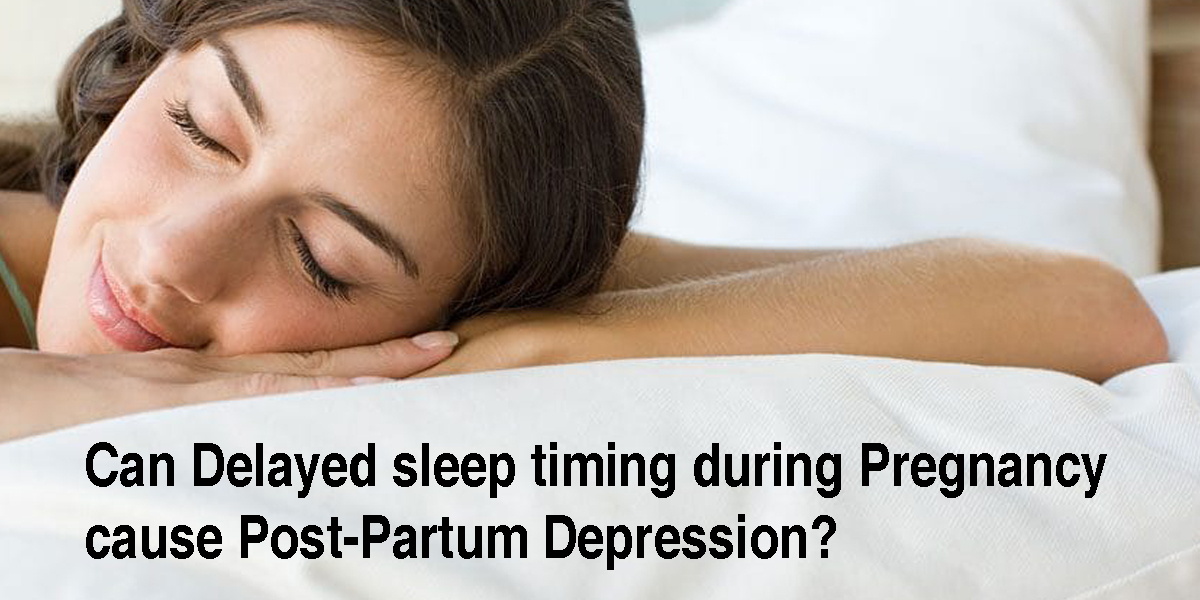Insomnia and depression are intertwined. Sleeplessness can darken your depression and depression can impact your sleep. But is delayed sleep timing during Pregnancy and Post-Partum Depression related?
Well, many studies say it is!
The postpartum period is very stressful for a new mother. While her body bleeds, she has to nourish and feed the fragile life! Sleepless nights, tired body, anxiety, fear, frustration can be overwhelming!
Did you know?
About 85% of women experience mood disturbance during the postpartum period.
For most new moms this feeling is short-lived. But a few may suffer from severe depression.
Symptoms of Postpartum Depression
- Feeling gloomy for no reason.
- Being in a bad mood.
- Feeling helpless and hopeless.
- Bursting out in anger or tears.
- Loss of interest in usual activities.
- Feeling guilty, incompetent and worthless.
- Fatigue and sleep disturbance.
- Change in appetite.
- Not feeling attached to the baby.
- Suicidal thoughts.
Causes of Postpartum Depression
Postpartum Depression can stem from many reasons. Resentment in a relationship is the strongest factor that can trigger depression. The hormonal surge after delivery adds to this plight. Apart from these, a feeling of losing hold over life can cause depression.
Recent research on Postpartum depression has revealed a new possible trigger. And that’s sleep deprivation during pregnancy.
Delayed sleep timing during Pregnancy and Post-Partum Depression
Women start to experience a shift in their sleep regime right from the first trimester. As their pregnancy progresses, sleep quality deteriorates. Both sleep time and sleep efficiency decrease with each passing day.
Did You know?
About 40% pregnant women report insomnia in the first trimester. And over 60% complain of sleep troubles by the third trimester.
The graph of sleep loss sharpens on the nights close to birth. In the third semester, many pregnant women complain of sleep troubles. And this worsens after delivery. It is only after three months after delivery that women’s sleep begins to improve gradually.
Also Read: Why women needs more sleep than men?
Research: Delayed sleep timing during Pregnancy and Post-Partum Depression
Disturbed sleep is common among pregnant and postpartum women. Heaviness. Sweats. The frequent urge of urination. Constant uneasiness. All of these keep one awake throughout the night. Thus, disrupting the circadian rhythm of the body.
Circadian rhythm is the biological clock aligned with nature’s clock. A disruption in the circadian rhythm affects mental health even in healthy individuals. Sleep deprivation causes mood disorders and substance use. It also affects impulse control and cognitive function.
But does the change in circadian rhythm during pregnancy affects postpartum mood?
Research says it does!
The study examined sleep timing during the third trimester of pregnancy. And checked the patterns if this could predict the symptoms of mania, depression, and obsessive-compulsive disorder post-delivery.
The study concluded that sleep timing may be a modifiable risk factor for postpartum depression.
Also Read: Memory foam pillows can improve your sleep
The deets of this Study
A study concerning sleep delay and postpartum depression was conducted in fifty-one pregnant women at 33 weeks of gestation. The women had a previous but not active episode of depression.
Women were divided into “early sleep” and “late sleep” groups defined by the median-split time of 11:27 p.m. The study reported significant manic and depressive symptoms at postpartum week 2 in the “late sleep” group. It further revealed obsessive-compulsive symptoms at week 6.
Thus, the study could establish a link between delayed sleep time and postpartum depression among women with previous history. The symptoms recorded are mania, depression, and OCD.
Also Read: Sleeping more on weekends!
Delayed sleep timing during Pregnancy and Post-Partum Depression are linked!
Maintaining an early bedtime is very crucial for pregnant women. Pregnancy and delivery are very crucial phases in a woman’s life that takes a huge toll physically and mentally. One way to guard the mind is by maintaining a good circadian rhythm by sticking to an early bed routine.
Also Read: Good sleep means Healthy Circadian Rhythm


9 comments
👌👌👌 sir
thank you
[…] the circadian rhythm right. If the sleep is disturbed, the entire routine goes downhill. Delay in sleep has damaging effects beyond the […]
[…] Also Read: Can delayed sleep timing during pregnancy cause post-partum depression? […]
[…] Also Read: Delayed sleep timing during pregnancy and post-partum depression […]
[…] Also Read: Delayed sleep timing during pregnancy and depression […]
[…] Also Read: Delayed Sleep timing during Pregnancy can lead to depression […]
vardenafil generic – vardeed.com male erection pills
There is certainly a lot to find out about this subject. I really like all the points you ave made.